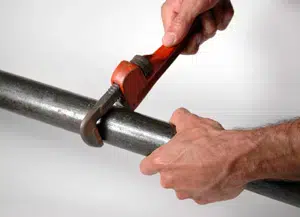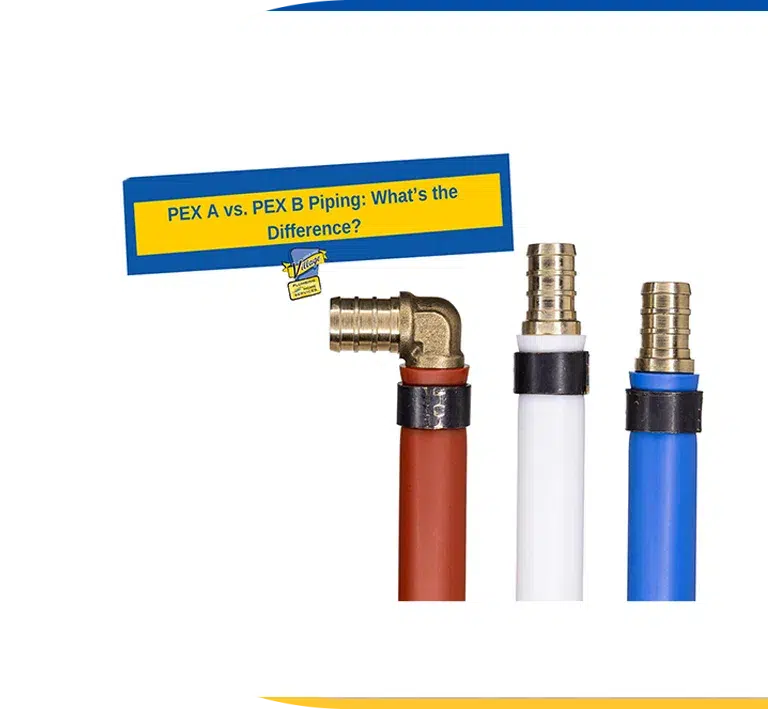Whole-House Repiping Services in Houston
Hire a Repiping Specialist
Sewage Backups can be a Health Hazard
Signs You Need Repiping
When properly installed, pipes can last for many decades. But when pipes start to break down, especially older copper and galvanized pipes, you’ll start to notice symptoms such as:
- Reduced water pressure from faucets
- A brown or red tint to the water
- Screeching, thudding, or clicking from pipes and faucets
- Problems when using fixtures simultaneously
- Discolored walls and ceilings
- Mold, mildew, and signs of water damage
- A consistent increase in water bills
These are signs your water is impure and your plumbing system needs to be updated. Leaks and mold can occur where you can’t see them and cause plumbing fixture, appliance, and structural damage. Fortunately, we use high-quality durable, strong, and corrosion-resistant materials that can tolerate high demand.

Our Repiping Process
Decades of experience in repiping Houston homes have enabled us to develop a solid whole-house repiping process. We begin with a full inspection and assessment of your plumbing system. Repiping generally involves removing drywall in strategic areas. You’ll have to move furniture and other valuables away from work areas and cover it to prevent damage. The water supply will be turned off during the project unless the plumber builds the new pipes next to the old lines. When the plumber is finished, the water is turned back on, and the drywall is replaced and repainted.
Every repiping project requires a work permit before it can begin. A professional inspector must examine the work when it’s completed. When they approve of the work, walls can be patched up and repainted. The length of time repiping takes depends on the project and the size of your home. Generally, it takes anywhere from two days to a week.
Plumbing Pipe Materials
We specialize in the highest-quality materials commonly used for today’s plumbing pipes. These include:
- Copper: Copper pipes are reliable and corrosion-resistant, suiting them for water supply lines. They can be rigid (for longer runs) or flexible (for short runs). Copper’s softness makes it easy to cut and fabricate, although it is prone to damage, rupturing due to frozen water, and developing pinhole leaks over time.
- PEX: Cross-linked polyethylene (PEX) is strong, flexible, and tolerates temperature extremes. It’s also less prone to leaks. PEX piping reduces the number of fittings needed, so it is faster to install, but does require specialized fittings and tools. It’s available in blue for cold water lines and red for hot water lines.
- PVC: Polyvinyl Chloride (PVC) is a rigid, strong, chemical-resistant pipe material. It is easy to cut and fit, so is often used to replace damaged sections of a cast-iron wastewater pipe. It may be used for sanitary waste lines, drain traps, and vent pipes.

Galvanized steel pipes were used quite often up until the 1960s. But they tend to corrode and rust on the inside over time. The presence of lead can pose a health risk. Old galvanized pipes are now near the end of their functional life and should be replaced.
Benefits of Repiping
- Improved water pressure
- Increased water quality
- Enhanced energy efficiency
- Cost savings over time
- Pipes that will last several decades
- Replacement of outdated or hazardous materials
- Prevention of leaks and water damage
Frequently Asked Questions
How much does repiping cost?
Many factors affect the cost of repiping. Repiping an entire house can cost from $1,500 to $15,000 (according to Angi) depending on the size of your house, the number of plumbing fixtures, the pipe material used, the diameter of the pipes, and ease of access.
Can I stay in my home during the repiping process?
Plumbers usually don’t work in every room at the same time. You can stay at home during the project. But know there will be lots of activity and water may not always be available. During that time, you may consider visiting a family member or friend or running errands.
How do I choose the right repiping material for my home?
Copper pipes are strong, long-lasting, and suited for rugged applications like outdoor plumbing. If using PEX pipes, consider whether they’ll be exposed to sunlight, which can degrade them. Used indoors, they provide a leakproof, energy-efficient option. If there are lots of tight areas and sharp corners to work with, flexible pipes are the easiest to install.

